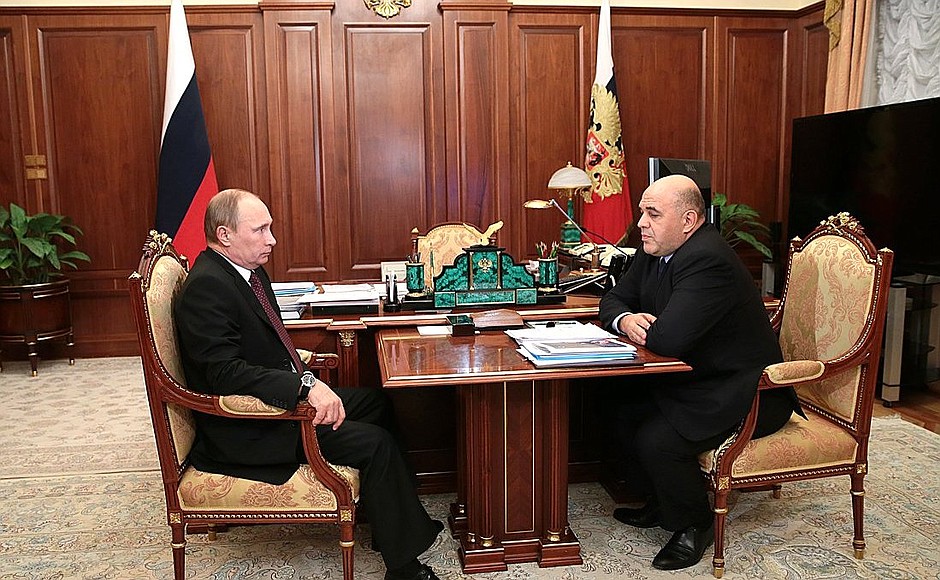
Head of The Federal Taxation Service Mikhail Mishustin: Mr President,
Although we have faced a difficult situation in the economy and a slowdown in GDP growth, we have continued our efforts to break the trend in tax collection that we saw during the summer. Over the first 10 months of 2013, Russia’s consolidated budget received 9.4 trillion rubles [over $287 billion] in revenue, which is up 2.4 percent on the result for the same period last year. The federal budget received 4.4 trillion rubles, which is up 2.6 percent on last year’s result.
Regarding the difficulties in collecting value-added tax and profit tax, they are above all related to substantial material deductions that big companies in which the state holds a stake can make when they carry out major investment projects. There are issues related to temporary differences when submitting updated profit tax declarations and issues concerning accelerated depreciation.
I have already reported on the instruction you gave to find a way to establish a system for the Taxation Service to keep the Government updated on material deductions and on the investment plans of companies with state participation. We drafted the relevant document, the Finance Ministry and the Economic Development Ministry have approved it, and it is now with the Prime Minister. It contains directives to state representatives in big investment companies to present information on all material deductions in accordance with particular guidelines. This would include the figures for updates, for investment projects and for accelerated procedures for reimbursing value-added tax. This would help us to manage value-added tax collection more efficiently. We are doing everything necessary to ensure that the budget parameters are met by the end of the year.
Mr President, I also wanted to tell you about a new service that we will be presenting next month: a personal account for legal entities. I briefed you last year on how we offered taxpayers who are Russian citizens their own personal account with the tax services. Over the last year, more than 5 million individuals have registered and set up their personal accounts. More than 2.5 million people paid taxes totalling slightly more than 2 billion rubles over the internet, without direct contact with the tax services, using these new services. These are all small taxes such as property tax and land tax, and this system means people do not have to actually come to the tax offices themselves but can deal with matter with the help of this easy-to-use service.
What does the legal entity’s personal account involve? It gives companies, legal entities, the possibility of not having to deal directly with the tax services. In other words, there is no direct contact. I can tell you that the official side of putting in place all the procedures related to the tax offices’ services is now complete and everything can be done through the new services we have established by means of electronic digital signature. Users can get account statements, records of deductions, check the status of their accounts and much more.
We had 500 companies using the personal account service in test mode over the last year. Starting from January 1, we will extend the service to the entire country. As I said, the aim is to eliminate direct contact and simplify dealings with the tax service for both individuals and companies.
As far as international work goes, you have been following it closely and attended the Organisation for Economic Cooperation and Development (OECD) Forum on Tax Administration, when we had more than 50 heads of tax services from around the world meeting here in Russia. We are working actively and we have made progress. This year, Russia moved up another 8 places in the “tax payment” section of the Doing Business rating (last year we were in the 41st place), and we also moved up 13 places in the “company registration” section. The innovative procedures we have introduced, the possibility for dealing with the taxation services without personal contact, and simplification of many tax payment procedures made possible what amounts to a decent boost on the Doing Business rating.
President of Russia Vladimir Putin: Good. I would also like to ask you to come back to the discussion about articles 198 and 199 of the Criminal Code regarding tax violations. Let’s talk about this in more detail. In any event, I would like you to get an expert evaluation done on this matter and organise the relevant joint work with the law enforcement agencies, including the Investigative Committee.
Mikhail Mishustin: Mr President, first of all, there is no doubt that there is a clear need to forward information on the relevant cases to the law enforcement authorities. Passing on this information, including to the Investigative Committee, is essentially part of the procedures that make for effective management of issues that include the taxation service’s actions too.
It is very important that the tax service should take part in this process. Here we are talking about the situation with the taxation service’s procedures and actions. We send our teams out to make inspections on site. The Tax Code gives taxpayers a certain time to make good on their obligations. Once the relevant decision and demands have been presented, there is a two-month deadline given, after which all of the materials related to the case, no matter what their origin, are handed over to the Investigative Committee. That was the procedure that used to be in place.
Together with the Investigative Committee, we have set up a working group, following your instruction, to examine possibilities for adjusting the legislation and making more effective use of tax service information together with the information in the law enforcement agencies’ possession.
I want to ask you to ensure that as far as inter-agency cooperation goes with the Interior Ministry and the Investigative Committee, everything is transparent and carried out according to clearly defined procedures that comply with the Tax Code and with the Criminal Code’s provisions. You spoke about the need to harmonise all of this. We are working on this right now and will report on it.
Vladimir Putin: The main thing here is not to create any potential for added pressure on business, while at the same time making sure that all participants in the process fulfil their obligations to the state and do not shift their share of responsibility to people who are not in business and pay their taxes as required. I am talking above all about factory workers, agriculture sector workers and the intelligentsia. They make up the majority after all.
Business has a special responsibility for the economy and job creation, and we must provide it with the right conditions. You said in your initial remarks that the situation is improving, and we must make sure that we do nothing to worsen the picture. On the contrary, we must continue our efforts to improve the situation, but the general rules and the overall situation must be completely fair for all members of our society and for every individual, whether or not he or she is in business.
Mikhail Mishustin: Mr President, you asked us to examine possibilities for cooperating with the Investigative Committee on these sorts of cases. The essence of articles 198 and 199 (tax evasion) is about not submitting a tax declaration or declaring false information. There must therefore be a motivated judgement regarding the tax declaration in deciding to press charges in such cases.
I think that this is precisely the approach we will follow: the combination of the Federal Tax Service’s clear opinion and the information from the law enforcement agencies will make it possible to make a judgment based completely on the law and the enforcement of the Tax Code’s provisions.
Vladimir Putin: The law could set the obligation for the law enforcement agencies, including the Investigative Committee, to request the relevant information from the tax authorities so that tax service information will always be on hand too. You can discuss the details with your colleagues and present your coordinated proposals to me.
<…>
